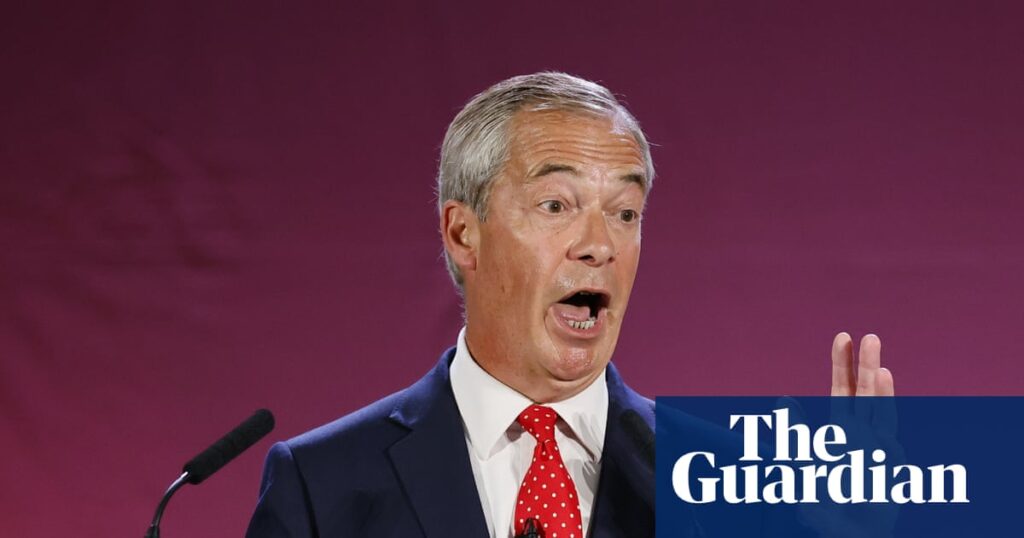Nigel Farage has been accused of “ugly” and “destructive” rhetoric after announcing plans to deport hundreds of thousands of asylum seekers, and pledging to pay despotic regimes such as the Taliban to take them back.
Unveiling Reform UK’s “Operation Restoring Justice” at a combative press conference in Oxford, Farage said he would rip up the UK’s postwar human rights commitments, contained in a range of international conventions, to deport “absolutely anyone” – including women and children – arriving by small boat.
Branding asylum seekers as a threat to national security and to British women, he claimed his plans would stop Channel crossings “within days” and “save tens and possibly hundreds of billions of pounds”.
Downing Street accused Farage of not being serious about his plans but in a sign of how Reform has set the tone for public debate, the prime minister’s spokesperson refused to criticise his references to irregular migration as an “invasion” and a “scourge”, or his prediction that Britain is “not far away from major civil disorder”.
Pushed on whether it would be a good idea to sign a returns deal with Taliban-controlled Afghanistan, as Farage proposed, the spokesperson said the government was “not going to take anything off the table”.
The Conservatives merely accused Reform UK of “reheating and recycling” Tory plans.
The Liberal Democrat leader, Ed Davey, said: “We really are through the looking glass now. Nigel Farage pretending to be patriotic while pledging to rip up Britain’s proud record of leading the world on human rights.
“As we’ve seen across history, his populist playbook is ugly, powerful and incredibly destructive. We know where it will lead if we don’t stop it.”
Laura Smith, the co-head of legal at the Joint Council for the Welfare of Immigrants (JCWI), said:“If today feels like a Rubicon moment, it’s because it is. We are hearing proposals that would tear through centuries of British legal tradition – from the Magna Carta to the Human Rights Act – with barely any resistance from those who should be defending those values.
“The ban on torture is absolute and fundamental; it cannot be bargained away. That mainstream parties have failed to push back is deeply alarming. This isn’t about migration policy any more, it’s about whether we still value the basic human rights and freedoms that define a democratic society. Now more than ever, we must fight against the normalisation of this rhetoric.”
Farage argued that “over three-quarters” of small-boat arrivals were “young undocumented males” from “cultures entirely different from ours” who were “unlikely to assimilate” and “pose a risk to women and girls”.
Asked about some of his language, the Downing Street spokesperson said “we have to recognise the strength of feeling about this” and stressed “the serious, practical action” it was taking to address the issue.
His criticism was instead focused on how leaving the European convention on human rights (ECHR), as proposed by Farage, was unrealistic because it underpinned key international agreements on trade, security and migration and the Good Friday agreement.
As well as leaving the ECHR, Reform’s leadership said it would repeal the Human Rights Act, disapply the 1951 refugee contention and the UN convention against torture as well as the Council of Europe’s anti-trafficking convention. Legal experts said such moves would not be a panacea.
Adam Wagner KC, a leading human rights barrister, said: “As much as there’s this focus on international law, as if international law is the thing that’s stopping people being sent, for example, to be tortured in other countries, I think they might find that the British courts, which I think they still quite like at the moment over international courts, have something important to say about people’s rights.
“A lot of the convention rights come from British common law rights.”
after newsletter promotion
Farage was unable to name a single RAF base to be converted into secure detention facilities, despite insisting they would be central to his plans. He could not explain how Reform’s scheme would be funded, beyond claiming costs would be a fraction of independent estimates.
He offered no detail on how Reform would secure deportation agreements with countries such as Iran, Afghanistan, Eritrea and Sudan, many of which have no return treaties with the UK and are considered unsafe by British courts.
George Peretz KC, the chair of the Society of Labour Lawyers, said: “The Reform party’s policy is simply not rooted in reality. They want to institute a mass deportation programme with no real, or workable, idea of where people would be deported to.
“Reform’s policy would require a returns policy to be negotiated with regimes such as the Taliban and Iran, and may, by their own admission, involve paying those regimes to do so. Which is impractical and extremely concerning, as well as unlawful (as our own courts ruled in the Rwanda case).”
Kolbassia Haoussou, the director of survivor leadership at Freedom from Torture, said: “Men, women and children are coming to the UK looking for safety. They are fleeing the unimaginable horrors of torture in places like Afghanistan, Sudan and Iran. These laws were created in the aftermath of the second world war to protect us all. If Britain were to abandon this legacy it would hand repressive regimes around the world a gift and undermine the promise to defend our shared right to live a life free from torture.”
Farage claims the programme would deport up to 600,000 asylum seekers in a single parliament, yet the costings remain opaque.
A report by the Centre for Migration Control, which produced costings alongside the MP Rupert Lowe but is not led by him, estimated a near-identical mass deportation scheme would cost £47.5bn. Farage insists his plan would provide the same scale of removals for £10bn, but offered no operational blueprint or independent evidence to support the claim.

